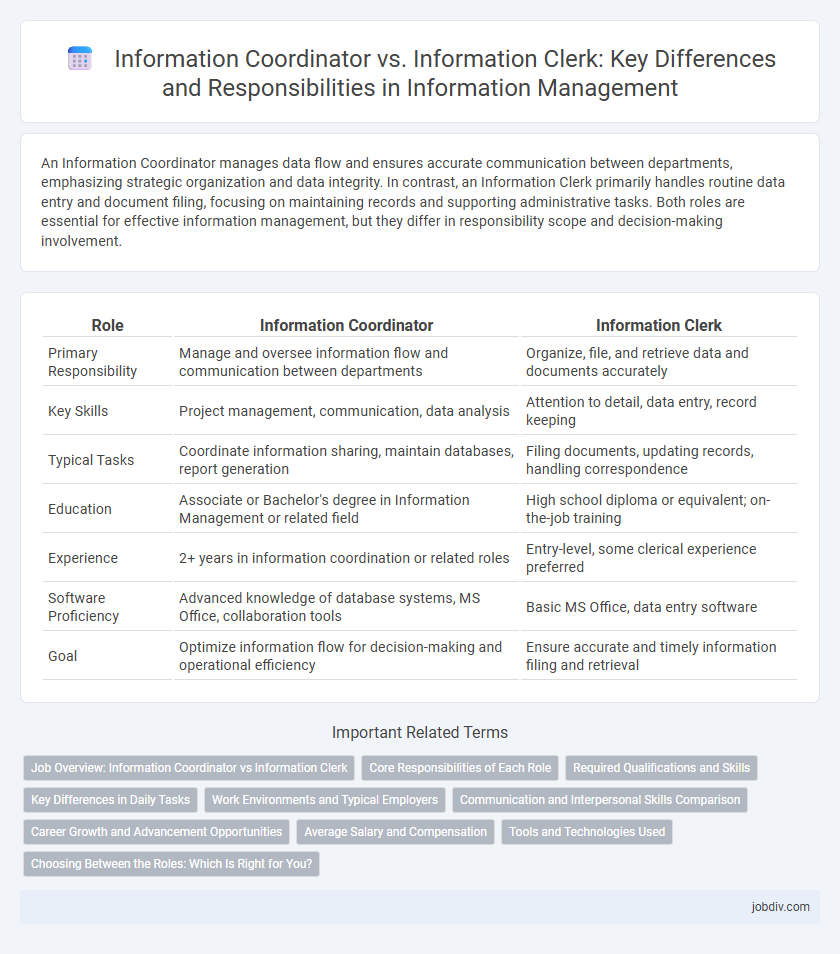An Information Coordinator manages data flow and ensures accurate communication between departments, emphasizing strategic organization and data integrity. In contrast, an Information Clerk primarily handles routine data entry and document filing, focusing on maintaining records and supporting administrative tasks. Both roles are essential for effective information management, but they differ in responsibility scope and decision-making involvement.
Table of Comparison
| Role | Information Coordinator | Information Clerk |
|---|---|---|
| Primary Responsibility | Manage and oversee information flow and communication between departments | Organize, file, and retrieve data and documents accurately |
| Key Skills | Project management, communication, data analysis | Attention to detail, data entry, record keeping |
| Typical Tasks | Coordinate information sharing, maintain databases, report generation | Filing documents, updating records, handling correspondence |
| Education | Associate or Bachelor's degree in Information Management or related field | High school diploma or equivalent; on-the-job training |
| Experience | 2+ years in information coordination or related roles | Entry-level, some clerical experience preferred |
| Software Proficiency | Advanced knowledge of database systems, MS Office, collaboration tools | Basic MS Office, data entry software |
| Goal | Optimize information flow for decision-making and operational efficiency | Ensure accurate and timely information filing and retrieval |
Job Overview: Information Coordinator vs Information Clerk
Information Coordinators manage the flow and organization of data across departments, ensuring accuracy and easy access by implementing systematic filing and communication protocols. Information Clerks primarily handle data entry, record maintenance, and retrieval tasks, supporting day-to-day administrative operations with detailed documentation management. Both roles require strong organizational skills, but coordinators focus on oversight and coordination, while clerks execute routine information processing.
Core Responsibilities of Each Role
Information Coordinators manage data flow by organizing, analyzing, and distributing information to relevant departments, ensuring accuracy and compliance with organizational standards. Information Clerks handle data entry, filing, and maintaining records, focusing on the systematic storage and retrieval of information within databases or physical files. Coordinators typically oversee broader information strategies and communication, while clerks focus on detailed administrative tasks supporting data management.
Required Qualifications and Skills
Information Coordinators typically require a bachelor's degree in information management, library science, or a related field, along with strong analytical and organizational skills. Information Clerks often need a high school diploma or equivalent, with emphasis on data entry accuracy, basic computer proficiency, and customer service abilities. Both roles demand effective communication skills and attention to detail, but coordinators generally require advanced knowledge in information systems and project management.
Key Differences in Daily Tasks
Information Coordinators oversee data management systems, develop policies, and ensure accurate information flow across departments, focusing on strategic organization and communication. Information Clerks handle routine data entry, file maintenance, and retrieval of information to support daily operations, emphasizing task execution and record-keeping. Coordinators engage in analysis and reporting, while clerks prioritize clerical support and documentation accuracy.
Work Environments and Typical Employers
Information Coordinators commonly work in corporate offices, healthcare facilities, and educational institutions managing data systems and coordinating information flow. Information Clerks are typically employed in government agencies, libraries, and customer service centers, handling data entry, filing, and record maintenance. Both roles often require interaction with digital databases but differ in their levels of responsibility and the complexity of information managed.
Communication and Interpersonal Skills Comparison
Information Coordinators excel in advanced communication and interpersonal skills, often managing complex information flow and facilitating collaboration across departments. Information Clerks typically perform routine communication tasks, focusing on accurate data entry and basic customer interactions. The coordinator role demands stronger problem-solving abilities and proactive engagement, whereas clerks prioritize clarity and consistency in daily information processing.
Career Growth and Advancement Opportunities
Information Coordinators often experience greater career growth and advancement opportunities than Information Clerks due to their strategic role in managing data flow and ensuring information accuracy across departments. Information Clerks typically handle routine data entry and record-keeping tasks, which offer limited scope for skill development and promotion. Professionals seeking to advance in information management benefit from acquiring skills in data analysis, project coordination, and communication, which are critical for transitioning from an Information Clerk to an Information Coordinator role.
Average Salary and Compensation
The average salary of an Information Coordinator typically ranges between $50,000 and $65,000 annually, reflecting responsibilities in data management and communication coordination. Information Clerks earn a lower average salary, approximately $30,000 to $40,000 per year, due to their entry-level administrative and clerical duties. Compensation for Information Coordinators often includes performance bonuses and professional development benefits, while Information Clerks mainly receive standard hourly wages and limited additional perks.
Tools and Technologies Used
Information Coordinators utilize advanced software such as database management systems, enterprise resource planning (ERP) tools, and collaboration platforms like Microsoft SharePoint to organize and streamline data workflows effectively. Information Clerks primarily work with basic office applications including Microsoft Office Suite, data entry software, and document management systems to maintain accurate records and support administrative tasks. Both roles require familiarity with data processing technologies, but Information Coordinators engage with more complex analytical and integration tools to optimize information dissemination.
Choosing Between the Roles: Which Is Right for You?
Choosing between an Information Coordinator and an Information Clerk depends on your desired level of responsibility and skill set. Information Coordinators typically manage data systems, oversee information flow, and require strong organizational and communication skills, while Information Clerks focus on data entry, record keeping, and document retrieval with attention to detail. Assess your career goals, interest in decision-making versus routine tasks, and preferred work environment to determine the best fit.
Information Coordinator vs Information Clerk Infographic

 jobdiv.com
jobdiv.com